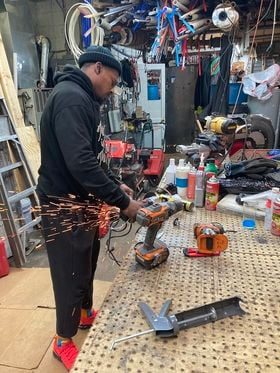Small Business Spotlight: Black Business Owners on Keeping Legacy Going in Family
February 21, 2022Jay Davis
Feb. 21, 2022
The family business wasn’t passed down to Domonique Bowen. She sought control of it for a specific reason.
“The business was strong from the time it opened until the early 2000s,” said Bowen, whose grandmother opened Chita’s Nefertiti Bar & Grill in 1994 on Detroit’s northwest side. “Then I saw my grandma hit a rough patch. I asked her what I could do to help, but I was young and she didn’t want to accept a lot of my ideas. I started to realize I didn’t want the business to fail.”
Bowen, 33, is one of many Black business owners working to build on what was established by a prior generation. The reasons are many, including continuing a legacy and proving to future generations that Black families can position their families for long-term prosperity.
Bowen, who used $10,000 of her own money, took over the 1,110-square-foot bar named after her grandmother, Conchita Leigh, in 2013. Prior to the change in ownership, Chita’s operated as cash-only and employees were paid under the table. Armed with a degree in business management, Bowen implemented credit card machines and payroll for a staff of six. Bowen said she didn’t take a paycheck for the first five years she owned the business.
Leveling playing field
In the United States, there are an estimated 134,567 Black-owned businesses, with $133.7 billion in annual receipts, 1.3 million employees and about $40.5 billion in annual payroll, according to U.S. Census Bureau data released in October on Black, Indigenous and People of Color (BIPOC)-owned businesses.
Those figures put Black Americans, which make up 13.4% of the U.S. population, third behind Asian American-owned businesses (581,200, or 5.9% of the U.S. population) and Hispanic-owned (346,836, or 18.5%).
James Mays, president of Detroit-based Mays Multimedia, believes lack of succession planning has hurt Black-owned businesses. Mays, whose father J. Caulton Mays established the company in 1946, believes showing children early the benefits of business ownership is vital to long-term success.

“Black business owners have to look at owning a business like playing Monopoly,” said Mays, whose multimedia printing and publishing company employs a staff of 20. “Your goal is to go around the board. What a lot of Black-owned businesses do, they go so far around the board, and when the owner dies or retires, everything stops. The next generation that takes over has to start over.
“The No. 1 thing that has to happen is the business owners, the first generation, have to show their kids the way and explain to them how the business supports the family, and that it can support their family.”
That perspective comes from Mays’ father, one of two Black printers in the city when he launched his business. Mays Printing originally operated out of the city’s Black Bottom and Paradise Valley neighborhoods.
James Mays became company vice president in 1977 upon graduating from Western Michigan University, then president in 2006 after his father died. His tenure with the company started at a young age, though, when as a 6-year-old he would visit his father’s business daily before school to sweep floors, sort paper and perform other odd jobs.
Mays took the same approach with his daughter, Elizabeth. She got her start at 11 working as a janitor before school. Following her freshman year at Western, Elizabeth interned at Mays as a customer service representative, handling order intake, and printing orders. When she finished college in 2011, Elizabeth moved back home to pursue a career in the family business and is now in her 11th year as chief executive officer.
“I wasn’t thinking about it initially,” Elizabeth Mays said, “but seeing how this company has done so much for so many people, I thought it was something I wanted to be a part of long term.”
Making up for an inequitable system
Taking a role in the family business can help Black children who might otherwise get lost in the shuffle, according to Fred Aikens, who has more than 25 years of experience in management at companies including Taco Bell, KFC, and YUM Brands Inc. Aikens believes Black families are lagging in creating generational wealth and business ownership because of an unequal distribution of resources.

“Suffice it to say that Black people in the U.S. suffer from more socioeconomic disparities than any other ethnic group in the country, and it’s institutional racism that allows it to happen,” said Aikens, associate professor of management at Central State University, a Historically Black College and University in Ohio. “A solution is to fix the education system and afford children from Black communities the opportunity to level the playing field.”
James Mays and his family have worked to level that playing field, sharing knowledge with other Black entrepreneurs.
“We’ve empowered people because we knew we couldn’t print everything in Detroit,” said Mays, who estimates his company at one point took on upward of 100 printing jobs a week.
“We’ve trained people, giving scholarship money to Ferris State University and Western Michigan University for students to earn degrees in printing. We were, at one time, the training ground when the white-owned companies wouldn’t hire Black pressmen.”
On our own
One major reason first-generation Black business owners push to get future generations involved is to give them the opportunity to work for themselves and with less capital than one might think.
Hardware Express, at 18450 Grand River Ave. on Detroit’s northwest side, is run by father-son team Milton and Javari Tinnon. The pair, along with two employees, is the whole staff of the store, which opened in 2011.

Javari Tinnon purchased the space in 2011 after a fire that destroyed another hardware store owned by Milton a mile away. Milton Tinnon has owned hardware stores for as long as Javari can remember, and he didn’t want that hard work to end with the blaze.
The current Hardware Express operates out of a 2,200-square-foot space, about five times smaller than a previous store.
“I thought that at this size, I could run the store alone,” said Javari, who began working with his father at 14. “One thing my father has taught me is that, as a business owner, it’s hard to depend on anybody else. Our staff has always been very small, but very knowledgeable.”
Like Mays, Tinnon is pushing the next generation to take a long, hard look at entrepreneurship. His 14-year-old daughter works weekends as a cashier at Hardware Express.
“It’s disappointing because so many Black people haven’t been taught through example,” Tinnon said. “Our children, Black children, need to know that they can do and be whatever they want to be. If hardware isn’t (my daughter’s) thing, I understand. But the things I’m trying to show her could put her on a path of entrepreneurship in another area.”
Bowen, the bar owner, sees entrepreneurship as a way to teach the next generation a different mindset. While college is useful, it’s not the only avenue to success.
“It’s hard, I’ll admit. There are days I get two hours of sleep,” Bowen said. “But I always knew I wanted to own something, I just didn’t know it’d be the family bar.
“Myself as a Black woman in the community I’m in, by expanding, I can offer more jobs and show more people this can be done. We don’t get a blueprint for this. Everything is trial and error. I’m absorbing so much and passing things on to different people — how to handle accounting, payroll taxes, dealing with the city as far as various paperwork and permits needed.”
Mays, who teaches a course on entrepreneurship at Wayne County Community College District, admires the likes of Bowen and Tinnon. The younger generation needs to take ownership of its community, he said.
“We’re watching everybody else get on the field and making money,” Mays said. “But I understand that can’t change unless people help and empower others. I had mentors: Don Barden, Mel Farr, Don Davis. They had a commitment to give Black businesses the funding they needed. They empowered people, made millionaires. We can’t deprive ourselves, as Black people, of all the money that’s out here.”
Improvements
Part of the reason for that disparity, Aikens said, is lack of access to capital, which he refers to as the systemic financial exclusion of people of color.
“There is some movement, though, in the banking industry to recognize the need for urban development in oppressed areas,” Aikens said. “Since the 2020 protests and the George Floyd murder, banks like Wells Fargo, Union Savings Bank and a few others have increased lending offered to Black homeowners and entrepreneurs.”
There may not be as many Black entrepreneurs as Mays would like, but Black-owned businesses are a major part of Detroit commerce.
An August 2021 Detroit Regional Chamber report found there were 33,000 Black-owned businesses in the city and about 44,000 in the state. Programs such as Motor City Match offer entrepreneurs assistance in getting their businesses off the ground. Of the first 130 Motor City Match cash grant winners, 80% are Black-owned, with 64% being run by Detroit residents. The program has awarded $8.6 million in grants since 2015. The U.S. Small Business Administration also offers programs for small business owners, and is one of the best resources for entrepreneurs, according to Aikens. JP Morgan Chase is also investing in the city and its entrepreneurs.
Neither Bowen nor Javari Tinnon sought out grants to establish their businesses, but believe the programs are helping level the playing field.
“I think having more Black entrepreneurs and business owners gives us a chance to keep dollars rotating through our community like a lot of other races do,” Tinnon said.

Bowen is proud of what her grandmother started and that she’s able to take the business to the next level. Last year, she purchased the building, its parking lot and a neighboring building for an undisclosed price. Bowen is planning to move Chita’s to the adjoining 5,200-square-foot space with a grand opening this summer. The current Chita’s space will become a new entity, she said. The move will create an additional 18 to 24 jobs.
“It kind of goes to show how mindsets and trajectory change when you have more information,” Bowen said. “I don’t think my grandmother thought past paying rent when the space could have been purchased and she could’ve been a taxpayer bringing more revenue into the bar. Now I don’t have to worry about anybody kicking me out for any reason.
“… I see a lot through my mother’s eyes, and she knew how much my grandmother loved this bar. To see the changes happening, it’s great. I want more people, more Black people, to know this can be done.”
